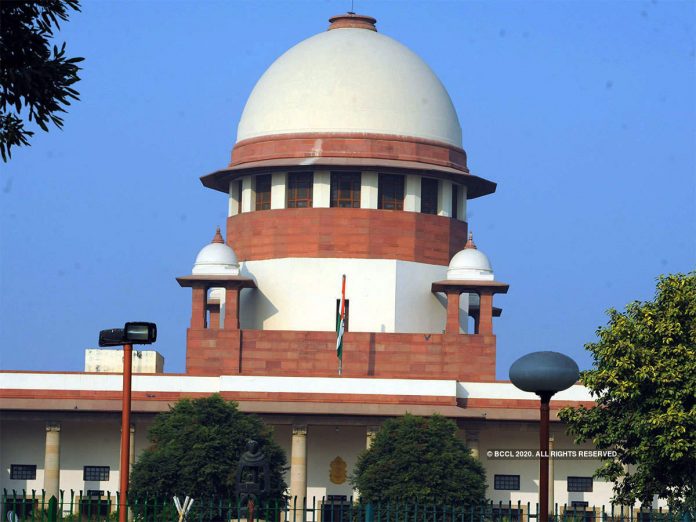The Supreme Court has upheld the order of NCLAT by which it had dismissed the petition filed by Ramesh Kymal, former Chairman and Managing Director of Siemens Gamesa India from claiming Rs 101.11 crore from company. (Ramesh Kymal Vs. M/s Siemens Gamesa Renewable Power Pvt Ltd.)
In his petition Ramesh Kymal had claimed that a sum of INR 104,11,76,479 was due and payable to him pursuant to his resignation “from all capacities held by him in the respondent in accordance with the various Employment Agreements/Incentive Agreements” entered into by him with the respondent during his tenure as Chairman and Managing Director.
The appellants case was that on 11 May, 2020, he had filed an application under Section 9 of the IBC on the ground that there was default in payment of his operational dues. During the pendency of the application, an Ordinance was promulgated by the President of India on 5 June 2020, by which Section 10A was inserted into the IBC. The newly inserted section has created a bar for entertaining application for CIRP and therefore NCLT dismissed the Plea and the same was upheld by the NCLAT. Hence he had filed an appeal before the Supreme Court.
The Supreme Court bench led by Justice Dr. Dhananjaya Y Chandrachud and Justice M. R. Shah has said the Ordinance and the Amending Act enacted by Parliament, adopt 25 March 2020 as the Cut-off date. The proviso to Section 10A stipulates that “no application shall ever be filed” for the initiation of the CIRP “for the said default occurring during the said period”. “Hence, the embargo contained in Section 10A must receive a purposive construction which will advance the object which was sought to be achieved by enacting the provision. We are therefore, unable to accept the contention of the appellant,” said the Apex Court.
The Senior Counsel Neeraj Kishan Kaul appearing for the appellant submitted that;
(i) Section 10A creates a bar to the ‘filing of applications’ under Sections 7, 9 and 10 in relation to defaults committed on or after 25 March 2020 for a period of six months, which can be extended up to one year;
(ii) The Ordinance and the Act which replaced it do not provide for the retrospective application of Section 10A either expressly or by necessary implication to applications which had already been filed and were pending on 5 June 2020;
(iii) Section 10A prohibits the filing of a fresh application in relation to defaults occurring on or after 25 March 2020, once Section 10A has been notified (i.e., after 5 June 2020);
(iv) Section 10A uses the expressions “shall be filed” and “shall ever filed” which are indicative of the prospective nature of the statutory provision in its application to proceedings which were initiated after 5 June 2020; and
(v) The IBC makes a clear distinction between the “initiation date” under Section 5(11) and the “insolvency commencement date” under Section 5(12).
The Counsel appearing for the respondents vehemently opposed the contentions and submitted that;
(i) The legislative intent in the insertion of Section 10A was to deal with an extraordinary event, the outbreak of Covid-19 pandemic, which led to financial distress faced by corporate entities;
(ii) Section 10A is prefaced with a non-obstante clause which overrides Sections 7, 9 and 10; and
(iii) Section 10A provides a cut-off date of 25 March 2020 and it is evident from the substantive part of the provision, as well as from the proviso and the explanation, that no application can be filed for the initiation of the CIRP for a default occurring on and after 25 March 2020, for a period of six months or as extended upon a notification.
Also Read: Republic Day Red Fort violence: Deep Sidhu sent to 7-day police custody
The Apex Court said, “Adopting the construction which has been suggested by the appellant would defeat the object and intent underlying the insertion of Section 10A. The onset of the Covid-19 pandemic is a cataclysmic event which has serious repercussions on the financial health of corporate enterprises.”
“We have already clarified that the correct interpretation of Section 10A cannot be merely based on the language of the provision; rather it must take into account the object of the Ordinance and the extraordinary circumstances in which it was promulgated. It must be noted, however, that the retrospective bar on the filing of applications for the commencement of CIRP during the stipulated period does not extinguish the debt owed by the corporate debtor or the right of creditors to recover it,”
-it said.
It further added, “Section 10A does not contain any requirement that the Adjudicating Authority must launch into an enquiry into whether, and if so to what extent, the financial health of the corporate debtor was affected by the onset of the Covid-19 pandemic. Parliament has stepped in legislatively because of the widespread distress caused by an unheralded public health crisis. It was cognizant of the fact that resolution applicants may not come forth to take up the process of the resolution of insolvencies (this as we have seen was referred to in the recitals to the Ordinance), which would lead to instances of the corporate debtors going under liquidation and no longer remaining a going concern.”
Also Read: Rajya Sabha consents to bill regulating unauthorized colonies in Delhi
“Hence, the embargo contained in Section 10A must receive a purposive construction which will advance the object which was sought to be achieved by enacting the provision. We are therefore unable to accept the contention of the appellant,” said the Court while dismissing the appeal.
Read the judgment here;
Ramesh-Kymal

